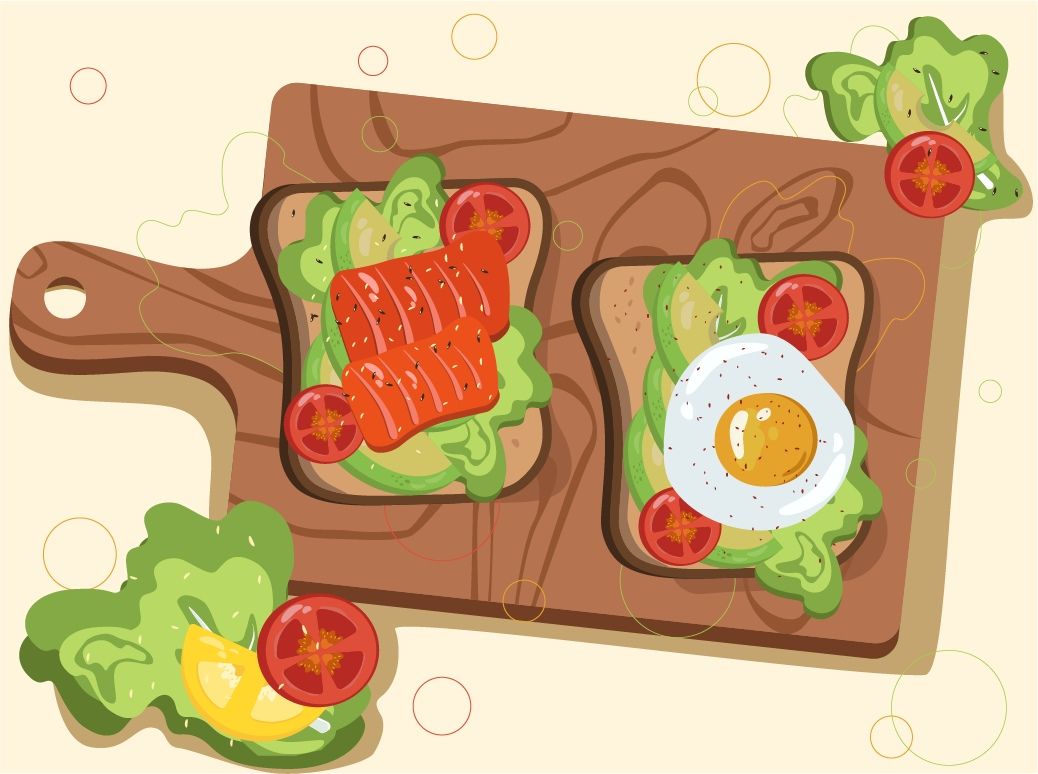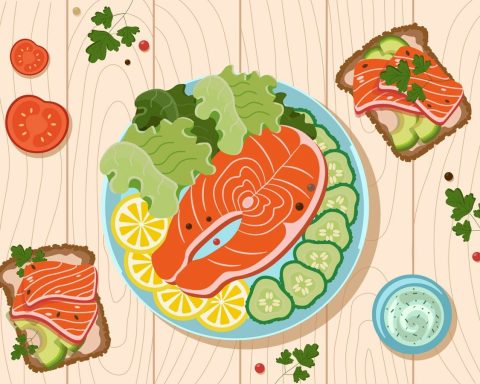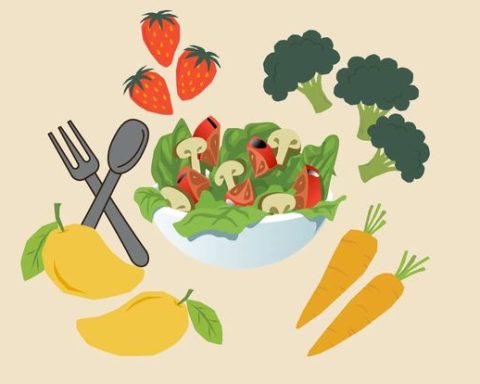The traditional wisdom of Ayurveda has long held that food plays a vital role in maintaining health and preventing disease.[1] Recognizing the significance of these age-old dietary principles, the Ministry of Ayurveda, Yoga, Naturopathy, Unani, Siddha, and Homeopathy (Ayush), in collaboration with the Food Safety and Standards Authority of India (FSSAI), introduced the Food Safety and Standards (Ayurveda Aahara) Regulations, 2022.[2] These regulations define “Ayurveda Aahara” as food prepared according to the ingredients, processes, or methods described in authoritative Ayurvedic texts, further listed under “Schedule A” of the regulation. To give Ayurveda Aahara a unique identity, FSSAI launched a dedicated logo on June 7, 2022, for Ayurveda Aahar, which contains the initials Ayurveda and Ahara with five leaves symbolizing five elements of nature. This logo helps in creating a unique identity, easy identification, and proven benefits to improve health and wellbeing.[3]
The launch of these regulations marks a significant step toward integrating Ayurveda-based dietary principles into the mainstream food system, particularly in the context of public health and well-being. The Ministry of Ayush has been proactive in promoting awareness about Ayurveda Aahara through various activities under Poshan Abhiyan and other national initiatives. These efforts centered on themes like “Ayurveda for Poshan” for the sixth Ayurveda Day, celebrated in November 2021, emphasize the relevance of regional, seasonal, and traditional foods for improving maternal and child health.[4] The activities aim to bring Ayurveda closer to everyday life by encouraging the consumption of food that aligns with both traditional knowledge and modern nutritional science.
Within this larger framework, the Central Council for Research in Ayurvedic Sciences (CCRAS) has been at the forefront of research and development efforts to scientifically validate and standardize the components of Ayurveda Aahara. As the apex institution for Ayurvedic research in India, CCRAS has undertaken several initiatives, including survey studies, scientific validation, and the standardization of traditional food recipes and medicinal plants. These initiatives not only seek to translate traditional community knowledge into public health practices but also to develop evidence-based dietary guidelines that can serve the health needs of contemporary society.
In this editorial, an attempt has been made to provide a glimpse of CCRAS’s notable research efforts, highlighting key studies on Ayurveda Aahara. These include the documentation and validation of traditional food recipes, the scientific exploration of medicinal plants used in ethnic diets, the development of standard operating procedures (SOPs) for Ayurveda-based recipes, and nutritional studies aimed at understanding the efficacy of these traditional foods. This comprehensive approach helps to bridge the gap between traditional dietary knowledge and modern scientific research, making Ayurveda Aahara more accessible and acceptable on a global scale.
As we delve into the details of these projects, it becomes clear that the integration of Ayurveda’s dietary wisdom with scientific methods not only enriches our understanding of food but also offers practical solutions for improving public health. The ongoing research initiatives under CCRAS will play a pivotal role in shaping the future of Ayurveda Aahara, ensuring its relevance and applicability in modern healthcare systems.
CCRAS Research Initiatives on Ayurveda Aahara
1. Translating Traditional Community Knowledge for Primary Healthcare: One of CCRAS’s significant projects involves documenting traditional community health practices and commonly used medicinal plants in Karnataka. The prospective, cross-sectional study focused on vegetable markets in Bangalore, identifying 25 medicinal plant vendors and buyers. Ten traditional health practices using these medicinal plants were recommended for primary healthcare. The project underscored the potential of integrating traditional knowledge into mainstream healthcare and received a certificate of appreciation for its success.[5]
2. Compendium of Ayurveda Dietetics: Cereals, Pulses, and Oil Seeds: CCRAS has undertaken substantial efforts to document and validate traditional dietary practices. As part of the proposed research on Ayurveda dietetics, comprehensive compendium reports were developed focusing on cereals and pulses. A total of 11 cereals and pulses were selected for this detailed analysis, covering aspects of botany, chemistry, and Ayurvedic significance. The species included in the study are Shali/rice (Oryza sativa L.), Yava/barley (Hordeum vulgare L.), Godhuma/wheat (Triticumaestivum L.), Nali/ Vajranna/bajra (Pennisetum typhoideum [Burm.f.] Stapf et Hubb.), Yavanala/jawar (Sorghum vulgare [L.] Pers.), Bahupatraka/Madhulika/ragi (Eleusine coracana [L.] Gaertn.), Mudga/green gram (Vigna radiata [L.] R. Wilczek), Masha/black gram (Vigna mungo [L.] Hepper), Chanaka/Bengal gram (Cicer arietinum L.), Kulattha/horse gram (Macrotyloma uniflorum [Lam.] Verdc.), and Adhaki/pigeon pea (Cajanus cajan [L.] Millsp.). For each of these species, in-depth documentation was carried out, encompassing their botanical characteristics, chemical composition, and their therapeutic roles and uses within Ayurvedic practice.[6]
Additionally, a project focused on oil seeds, where 15 medicinally significant plants were studied in the same comprehensive manner. These plants include Tila/sesame (Sesamum indicum L.), Eranda/castor (Ricinus communis L.), Sarshapa/mustard (Brassica juncea [L.] Czern.), Atasi/linseed (Linum usitatissimum L.), Narikela/coconut (Cocos nucifera L.), Karanja/Pongamia (Pongamia pinnata [L.] Pierre), Nimba/neem (Azadirachta indica A. Juss.), Kusumbha/safflower (Carthamus tinctorius L.), Bhuchanaka/groundnut (Arachis hypogaea L.), Suryamukhi/sunflower (Helianthus annuus L.), Vtada/almond (Prunus dulcis [Mill.] D.A. Webb), soybean (Glycine max [L.] Merr.), olive (Olea europaea L.), Niger (Guizotia abyssinica [L.f.] Cass.), and palm (Elaeis guineensis Jacq.). For these oil seed species, a chapter-wise compilation of monographs was prepared, detailing their botanical identification, chemical properties, applications.
This work represents a significant effort to integrate traditional Ayurvedic knowledge with modern scientific analysis, aiming to provide a well-rounded understanding of these important dietary elements in the context of health and wellness.
3. Documentation of traditional food recipes: CCRAS initiated a study, “Documentation and Validation of Traditional Food Recipes of Karnataka,” in collaboration with the University of Trans-Disciplinary Health Sciences and Technology, Bangalore; aiming to preserve and scientifically validate 100 traditional recipes from 20 locations across Karnataka. These locations were selected based on physiographic diversity, crop distribution, and local food cultures. The primary objectives are to document these recipes in a standardized format, analyze them from Ayurvedic and nutritional perspectives, and present the findings in an e-book and video tutorials. Additionally, the project aims to raise awareness about the health benefits of traditional foods and develop a scalable technology for community-driven food knowledge collection. Significant progress has been made, with 95% of the recipes collected, nutritional analysis completed for 47 recipes, and selected recipes prepared for feedback from 100 participants. The project is advancing towards completion, ensuring the preservation and dissemination of Karnataka’s rich culinary heritage.
4. SOPs for Ayurveda Recipes: The Council, in collaboration with CSIR-Central Food Technological Research Institute Mysuru, is working on developing SOPs for the preparation of 10 traditional Ayurveda recipes. Additionally, proximate composition and safety evaluations of selected recipes are being conducted on experimental animals to ensure nutritional safety and efficacy.
5. Survey and Documentation of Wild Edible and Medicinal Plants: CCRAS has extended its research to document wild edible and medicinal plants from markets in the southern Western Ghats of Karnataka, as well as in regions of Arunachal Pradesh. The documentation focuses on key identification features and the commercial value of these plants, further enhancing their potential for integration into Ayurveda-based health systems.
6. Ethnomedicinal and Traditional Food Documentation among Tribes: Studies among tribal communities, such as the Muthuvan tribes of Kerala and communities in lower Assam, Jammu & Kashmir, and Himachal Pradesh aim to preserve traditional knowledge about wild edible plants and millet/vegetable varieties. These efforts not only protect indigenous food traditions but also highlight their nutritional and medicinal value, reinforcing their relevance in contemporary health practices.
7. Formulation and Product Development of Ayurveda Recipes: CCRAS has also initiated product development projects, focusing on creating standardized formulations of Ayurveda recipes. The research includes proximate composition analysis, nutritional evaluation, and safety studies of traditional recipes on experimental animals. Notably, Poshak Yoga, an Ayurveda- based nutritional supplement, has been developed and supplied for clinical studies in specialized settings such as defense sports schools.
8. Product Development and Safety/Efficacy of plant-based food recipes: CCRAS—National Institute of Indian Medical Heritage, Hyderabad in collaboration with the ICMR-National Institute of Nutrition, Hyderabad has recently initiated two projects viz. (A) “Development of Mahua (Madhuca longifolia)-Based Food Recipe (Product Development) and its Nutritional, Toxicity, Efficacy, and Bioavailability Studies”; (B) “Development of Opuntia elatior (fruit) based food recipes (product development) and its nutritional, toxicity, efficacy, and bioavailability studies” to develop SOPs for the preparation of Madhuca longifolia and Opuntia elatior (fruit)-based food recipes, establishment of pharmacopeia standards, and assessment of nutritional composition, along with ensuring their safety through acute, sub-acute, and sub-chronic toxicity studies on experimental animals. These projects also aim to investigate the efficacy of Mahua flowers and Opuntia elatior (fruit) along with their recipes in animal models for anemia.
Way Forward
The CCRAS is actively developing guidelines for disease prevention based on Ayurvedic dietary principles, providing practical recommendations for both health seekers and practitioners. These guidelines will ensure that the ancient wisdom of Ayurveda is preserved, scientifically validated, and adapted for contemporary needs, thereby strengthening the integration of traditional food systems into modern healthcare.
Conclusion
The research initiatives undertaken by CCRAS are pivotal in translating the traditional wisdom of Ayurveda into validated, standardized, and scientifically recognized dietary practices. Through its comprehensive surveys, documentation, validation studies, and product development, CCRAS is bridging the gap between ancient Ayurveda knowledge and modern scientific inquiry. This approach not only supports the preservation of traditional food practices but also ensures their relevance in addressing contemporary health challenges.




